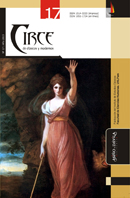Lucian and Tatian: about the Afterlife and the Last Judgment
Keywords:
Afterlife, Rhadamanthys, Lucian, Tatian, ReligionAbstract
The framework and the characters of Lucian’s descriptions of the afterlife, focusing in particular on the decisions of Rhadamanthys as a judge of human beings, show a kind of morality which can be analyzed both from the perspective of traditional Graeco-Roman stand-ards and from that of the new religious contexts of the Roman Empire. Christian apologists, on the other hand, like Tatian in Oratio ad Graecos, insist on distinguishing clearly between the judgment of Rhadamanthys and that of God himself. Both views of the afterlife are influenced by Greek myth and by Plato’s manipulation of it. The loss of the ancient function of myth among the pagans and the real presence of Christian issues regarding the afterlife may have caused a writer like Lucian to reflect on the real sense of the afterlife.
Downloads
Downloads
Published
Issue
Section
License
Los autores que tengan publicaciones con esta revista, aceptan los términos siguientes referidos a los derechos de autor/a:
1. Los autores/as conservarán sus derechos de autor y garantizarán a la revista el derecho de primera publicación de su obra, el cuál estará simultáneamente sujeto a la Licencia de reconocimiento de Licencia Creative Commons Atribución-NoComercial-CompartirIgual 4.0 Internacional (http://creativecommons.org/licenses/by-nc-sa/4.0/). que permite a terceros compartir la obra siempre que se indique su autor y su primera publicación esta revista. El autor es el titular del copyright.
2. Los autores/as podrán adoptar otros acuerdos de licencia no exclusiva de distribución de la versión de la obra publicada (postprint) siempre que se indique la publicación inicial en esta revista. La cesión de derechos no exclusivos implica también la autorización por parte de los autores para que el trabajo sea depositado en el repositorio institucional y difundido a través de las bases de datos que el editor considere adecuadas para su indización, con miras a incrementar la visibilidad de la publicación y de sus autores.
3. Se permite y recomienda a los autores/as difundir su obra a través de Internet antes y durante el proceso de envío, lo cual puede producir intercambios interesantes y aumentar las citas de la obra publicada.







.jpg)









2.png)



